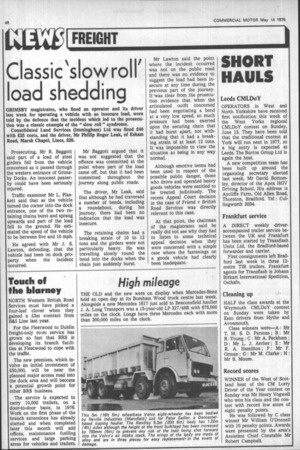Classic 'slow roll' load shedding
Page 50

If you've noticed an error in this article please click here to report it so we can fix it.
GRIMSBY magistrates, who fined an operator and its driver last week for operating a vehicle with an insecure load, were told by the defence that the incident which led to the prosecution was a classic example of the "slow roll" syndrome.
Consolidated Land Services (Immingham) Ltd was fined £40 with £25 costs, and the driver, Mr Philip Roger Leak, of Esham Road, Marsh Chapel, Lines, £20.
Prosecuting, Mr R. Baggott said part of a load of steel girders fell from the vehicle concerned as it passed through the western entrance of Grimsby Docks. An innocent passerby could have been seriously injured.
Traffic examiner Mr L. Plaskett said that as the vehicle turned the corner into the dock entrance, one of the two retaining chains burst and sprang upwards and part of the load fell to the ground. He estimated the speed of the vehicle to be between five and 10 mph.
He agreed with Mr J. S. Lawton, defending, that the vehicle had been on dock property when the incident occurred. Mr Baggott argued that it was not suggested that the offence was committed at the point where part of the load came off, but that it had been committed throughout the journey along public roads.
The driver, Mr Leak, said that although he had traversed a number of bends, including a roundabout, during his journey, there had been no indication that the load was insecure.
The retaining chains had a breaking strain of 10 to 12 tons and the girders were not particularly heavy. He was travelling slowly round the bend into the docks when the chain just suddenly burst. Mr Lawton said the point where the incident occurred was not on the public road and there was no evidence to suggest the load had been insecure at any time during the previous part of the journey. It was clear from the prosecution evidence that when the articulated outfit concerned had been negotiating a bend at a very low, speed, so much pressure had been exerted upon the securing chain that it had burst apart, not withstanding that it had a breaking strain of at least 12 tons. It was impossible to view the situation as being in any way normal.
Although emotive terms had been used in respect of the possible public danger, those who drove and operated heavy goods vehicles were entitled to be treated judiciously. The recent Appeal Court decision in the case of Friend v British Road Services was directly relevant to this case.
At that point, the chairman of the magistrates said he really did not see why they had to listen to some technical appeal decision when they were concerned with a simple case where the fastenings on a goods vehicle had clearly been inadequate.




























































































































































































































